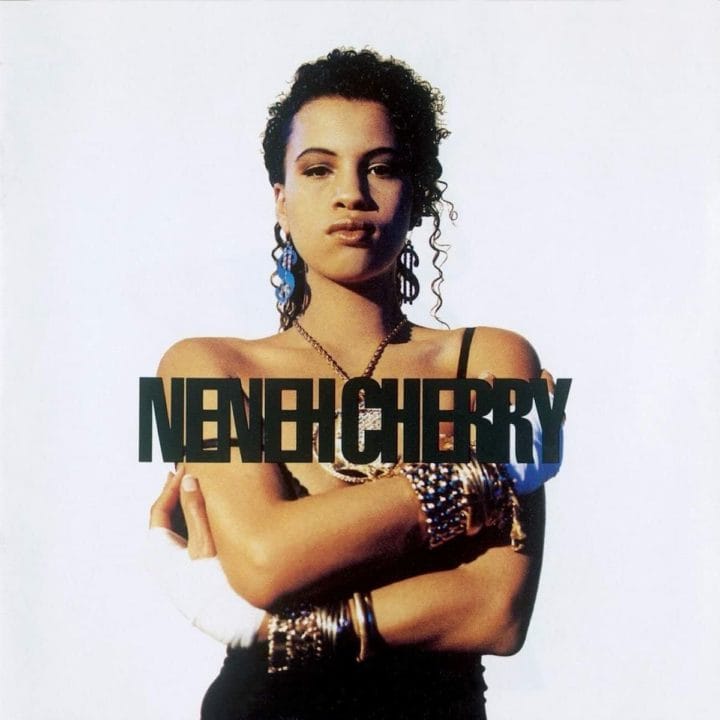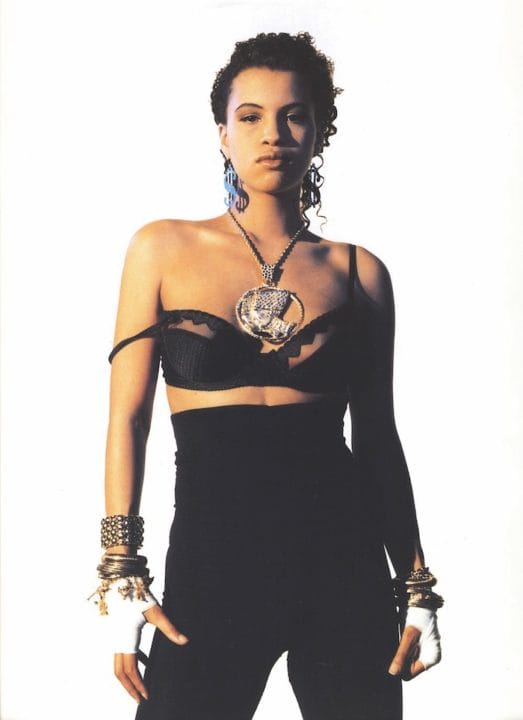Raised on the peripheries of jazz and punk, Neneh Cherry began her career with a pledge that she would always dance to the beat of her own drum and with Raw like Sushi, she made it impossible for us not to want to join her.
Given that Neneh Cherry was lauded as a fresh antidote to the homogenised pop of the PWL Hit Factory that ruled the British charts in the late 80s with the release of Buffalo Stance, it is somewhat ironic that a throwaway club hit produced by Stock, Aitken & Waterman in 1986 proved to be a major catalyst for her solo career.
Looking Good Diving by Morgan-McVey (Jamie Morgan and Cameron McVey) was released to little fanfare and failed to set the charts alight. However, whilst recording Looking Good Diving With The Wild Bunch-a remix for the single’s B-Side, Cameron McVey enlisted friend Nellee Hooper to help him cut up the instrumental of the A side & his girlfriend to record a rap for the song.
Neneh Cherry had been a fixture of the London punk scene since arriving in London from New York in 1980, aged 16. She had been born in Stockholm to bohemian parentage, her mother Moki was an artist and her father Ahmadu Jah was a Sierra Leonian drummer, and was raised by her mother and stepfather, jazz supremo Don Cherry, in a culturally-rich childhood divided between Sweden and New York.
Having grown up around such luminaries as Miles Davis, Ornette Coleman, Roy Ayers and Talking Heads, Neneh was confident she would make a career for herself in music. “I always suspected that music would become my career,” Neneh tells Classic Pop. “I dropped out of school very early so music just felt like a natural thing to turn to.”
Whilst accompanying her father on a tour of the UK with The Slits, Neneh befriended the group’s singer, Ari Up. Feeling an immediate connection to London, Neneh made it her home the following year. “It was the first place I felt like I fitted in,” she recalls. “There was a spirit and mentality about it and culturally, things were allowed to mix together on a different level.”
Fully immersing herself in London’s pan-cultural scenes, Neneh sang in bands including The Slits, The New Age Steppers, Rip Rig & Panic and Float Up CP, as well as deejaying on the pirate radio station Dread Broadcasting Corporation and performing at open mic nights at the UK’s first hip-hop club, The Language Lab at Gossips in Soho.
Neneh had met Cameron McVey while they were both modelling as part of Ray Petri’s hugely influential Buffalo collective of creatives. They became a personal and professional partnership with Cameron nurturing Neneh’s raw talent and encouraging her to write some of her own songs, with him assuming the role of co-writer/producer Booga Bear.
“Those songs that would eventually form Raw Like Sushi was the first music I really wrote myself,” Neneh says. “Cameron, my husband and writing/producing partner was shocked that I’d not written a song in my early groups so he bought me a Dictaphone as a present and told me to fill it with songs, which I did.
“It was the start of our musical relationship so obviously he bought a new perspective to music making which I’d not experienced before. Also, with Cameron being one of the original Buffalos-Ray Petri’s creative mafia of the mid to late 80’s, that also had a huge effect on our music making. Ray was there in between all the grooves.”
As well as Ray Petri, Raw Like Sushi was very much shaped by Neneh’s nomadic upbringing, incorporating a string of different influences, such as rap, dance, punk and jazz, culminating in an album that perfectly captured the vibrancy of London at the time, yet was simultaneously unique thanks to the genre-hopping, sonic schizophrenia of its creator.
One of the last tracks recorded for the album, was its first single, Buffalo Stance. Producer Tim Simenon, who had enjoyed success as cutting edge dance act Bomb The Bass, came up with the idea of revisiting the Morgan-McVey track that Neneh had performed on.
“The credit for Buffalo Stance really has to go to Tim,” Neneh says. “He found Looking Good Diving With The Wild Bunch, suggested we recut it, so we just did it without much thought. It was just the right time, right place and captured the energy that was in that era and defined something that was going on. There’s something about it that’s timeless and even now it stirs something up in people.”
An instant classic, Reaching the Top 3 in the UK, US and right across Europe, Buffalo Stance was bristling with attitude, with Neneh’s Long Island-meets-Ladbroke Grove witticisms over Simenon’s crisp production, it firmly established Neneh as one of music’s most exciting new talents.
By the time Buffalo Stance peaked and Neneh was invited to perform on Top Of The Pops, she was seven months pregnant with her second daughter. Delivering an energetic performance with her Buffalo styling perfectly intact (a huge gold medallion swung over her lycra-clad pregnant stomach), the performance caused a furore.
Deemed in equal measures shocking and as an empowering image of female strength, Neneh says that neither even occurred to her at the time. “I just thought it was funny!” she laughs. “I had no choice! It wasn’t like I was making some huge statement-I was pregnant and I was working. Done deal!”
As Buffalo Stance was riding high, Neneh and Cameron prepared themselves for the imminent birth of their child while continuing to work at their home, which became the creative hub of the recording of Raw Like Sushi. “ We wrote a TON of songs and it took about a year,” Neneh recalls. “Most of the album was recorded in our house in Kensal Green.”
Following the birth of Neneh’s daughter Tyson in early 1989, she and Cameron completed Raw Like Sushi and released it on May 2nd 1989.
Preceded by another Top 10 hit, Manchild, the album earned rave reviews with critics praising Neneh’s no-nonsense lyrics dealing with a vast range of subjects from hardship, hustling and heartbreak, to the complexities of relationships and friendships all set to an immaculately fresh-sounding cacophony of samples, scratches and soulful harmonies, pulled together by Neneh’s voice which was able to veer from vitriolic raps to vulnerable harmonies in the space of a single verse.
The album was an instant success around the globe, reaching No.2 in the UK and Top 10 throughout Europe. Though the album stalled at No.40 in the US, Neneh became an underground hit, suffering from the segregated categorisation of music there-with Neneh being considered “too white-sounding” for black radio stations and vice-versa, or which category to put her records in in stores.
Unsure of how to market her, Neneh told her record company to put her music “wherever they wanted to. I didn’t care and it certainly wasn’t changing!” she laughs. “Cameron and I have always done exactly what we wanted and this drove Virgin Records NUTS, but they were always really nice about it!”
As the album continued to sell (it peaked at No. 2 and went on to sell over two million copies) and to produce further hits in Kisses On The Wind and Inna City Mamma, Neneh was unstoppable throughout 1989, pulling off the difficult task of achieving huge commercial success whilst retaining a seemingly effortless sense of cool, which endeared her to everyone from teenage girls in awe of her sassy attitude, to the style mags such as The Face and i-d, who salivated over her style credentials (stylist Judy Blame and photographers Mark Lebon and Jean-Baptiste Mondino were frequent collaborators). However, the level of fame Raw Like Sushi’s success afforded her was something she had never expected.
By the end of the 1989, Neneh was feeling increasingly stifled by the role of Fresh Princess Of Pop she had unwittingly found herself cast in. The punk poetess was now a fully-fledged pop star, playing to thousands of screaming Brosettes at the Smash Hits Poll Winners Party and winning two Brit Awards (one of which she melted down to make jewellery, the other she gave to Soul II Soul’s Jazzie B, feeling he deserved it more).
Feeling a need to step back, from the spotlight, Neneh, along with Cameron formed a production company, helping Massive Attack & Portishead with their debut albums.
“Even before Raw Like Sushi did what it did, we set up our own production-management company to hold on to what we were doing,” Neneh recalls. “We literally had the reins from within our house, and then after Raw Like Sushi, we really felt that we wanted to give it back, feed some of what we’d gained into some new music.
“Cameron produced Blue Lines in our house. It was nuts: me breastfeeding baby Tyson with a full crew of Bristolians making an album and sleeping in our spare bedroom. They did the singing right outside our bedroom door in the hall!!!”
It was during the making of Blue Lines that Neneh began thinking about her next record. Resisting the demands to replicate Raw Like Sushi and the “cartoonish” character she was being pushed to be, claiming it would have “fraudulent” to do so, she was inspired to follow her gut feeling and make her approach to music-making authentic to her rather than chase sales.
Following a further two stellar albums, 1992’s Homebrew and 1996’s Man, which boasted a diverse list of collaborators including Michael Stipe, Biggie Smalls and Tricky between them, Neneh decided that she would now only partake in projects or collaborations which genuinely enthused her.
“I stopped working for a while,” Neneh says. “Cameron was writing and producing loads of cool stuff and was bringing home the bacon so I became a full-time mum and grandma.”
Following a breakdown exacerbated by the death of her mother, Neneh began to find writing cathartic and released Blank Project, her first solo album since 1996, earlier this year. Having spent the summer playing festivals, Neneh is thrilled with the reaction she’s had. “It’s been lovely that we’re receiving so much love again for the album & the shows,” she smiles. “Really beautiful.”
Neneh Cherry: Raw Like Sushi – The Songs
01 Buffalo Stance
A flawless fusion of rap and dance, Buffalo Stance was fresh, funky and bristling with personality-the perfect introduction to an exciting new talent. While Madonna had proclaimed “the man with the cold hard cash is always Mr Right” on Material Girl, Neneh shot down that notion on Buffalo Stance with “No money man can win my love-it’s sweetness that I’m thinking of”, a fierce declaration of female independence. “It’s about sexual survival,” says Neneh. “It’s not a feminist record – none of my songs are. It’s about female strength, female power, female attitude.”
02 Manchild
A complete departure from Buffalo Stance, Raw Like Sushi’s second single proved Neneh was an accomplished, emotive vocalist as well as a rapper-a fluidity that immediately set her apart from her peers. A sublime, reflective track dealing with threatened masculinity (“Is it the pain of the drinking, or the Sunday sinking feeling? The car never seems to work. When it’s late your girlfriend’s on a date, and the hero with her in your dream in your sleep it seemed like you. Turn around ask yourself”), Manchild was co-written with Massive Attack’s 3D, its fusion of hypnotic hip-hop beats, gorgeous strings and soulful vocals proving the blueprint for Massive Attack’s Unfinished Sympathy two years later.
03 Kisses On The Wind
With a club feel that evokes Shannon’s Let The Music Play, Hispanic bawdiness and a salsa rhythm, Kisses On The Wind was the poppiest moment on the album. The tale of a girl that embodied a potent, teenage sexuality (“More like a woman, she walks like one, she was the first girl to turn the boys on. Boys, boys, wrapped around her finger finger-so young, making love was only dreaming”), Kisses On The Wind became a Top Ten single both in the UK and in the US.
04 Inna City Mamma
Neneh sings the blues on one of the album’s most earnest, heartfelt moments, depicting the harsh realities of urban living. “Inna City Mamma, you bore another child to be victim of your cold blooded ways. Inner city love-from the gutter, so destructive when you sing your blues.” Touching on the issues of drugs, poverty, promiscuity, teenage pregnancy, the poignant track is as relevant today as it was when it was written. The song was the album’s fourth single in the UK and Neneh’s own personal favourite song from the album.
05 The Next Generation
In Neneh’s trademark style of delivering a powerful message over what appears on the surface to be a party track, The Next Generation is Neneh speaking out against the perils of casual sex leading to unplanned pregnancies and accepting responsibility for your actions (“You planted a seed that won’t grow a tree, ‘Cause the love that’s showing is a baby growing. Inside there’s a life that’s well worth knowing, knowing, knowing. If you’re gonna do it, think before you do it and do it right – right?”).
06 Love Ghetto
One of the many songs on Raw Like Sushi to deal with the complexities of relationships, Love Ghetto uses the analogy of game-playing in relationships and compares it to a baseball game-repeating the mantra “I’m in a home run, I’m in a home run. On the last stretch, on the last stretch,, come rain come shine, I’m leaving this love ghetto,” to describe the closing stages of a relationship with a lover that has wronged her.
07 Heart
A bitter tale of a woman who took another woman’s man just for revenge, Heart was a minor hit in the US and Australia. Released at the end of the Raw Like Sushi campaign, Neneh says the theatrical video she was forced into making for the song is something she regrets not having the nerve to say no to. “We went to America and shot this ridiculous video with David Fincher,” she says. We were totally convinced into doing it by the record company and I remember feeling in my belly, ‘Why am I doing this? Why am I here?’ It just wasn’t me at all.”
08 Phoney Ladies
One of the standout tracks from the album, Phoney Ladies is stylistically akin to Manchild, based around gentle hip-hop beats layered with synths, lending the track an ambient feel. Dealing with a toxic relationship, hurt and defiance are conveyed eloquently as Neneh delivers raw emotion such as: “So why don’t you stop? Phoney ladies in my face to cramp my freedom. And you don’t even wanna see them-calling names to cramp my freedom. Nobody’s gonna grab my freedom, nobody’s gonna mess me up.”
09 Outré Risqué Locomotive
One of the most upbeat party tracks on the album, Outré Risqué Locomotive is a sample and loop-heavy jam. It also repeats a message prominent through the album-urging girls to have some self-respect. “I make sure to preserve what I have, my body’s clean but my mind is bad. You know some girls and boys it’s sad, lost their love and all they had. Layin’, layin’ down all the time. Layin’ layin’ down on the ground. Being better known as a doormat,” she raps.
10 So Here I Come
An assured statement of self-affirmation, So Here I Come details Neneh’s disappointment and disillusionment with her schooldays and how life lessons were responsible for getting Neneh where she was. “I know where I’m going and where I’m coming from-so here I come.” The song received a lot of airplay on MTV thanks to a documentary-style video released to promote Neneh’s longform music video – The Rise Of Neneh Cherry.
11 My Bitch
A bonus track originally included on the CD version of the album, My Bitch was a throwaway rap track which was a duet with Gilly G. A playful war of the words between Neneh and Gilly, the song has aged less well than the album’s other songs thanks to the dated-sounding production. The song was a nod to Neneh’s love of reggae by reinterpreting a verse of Leroy Smart’s classic Happiness Is My Desire for Gilly’s rap.
Classic Pop may earn commission from the links on this page, but we only feature products we think you will enjoy.





